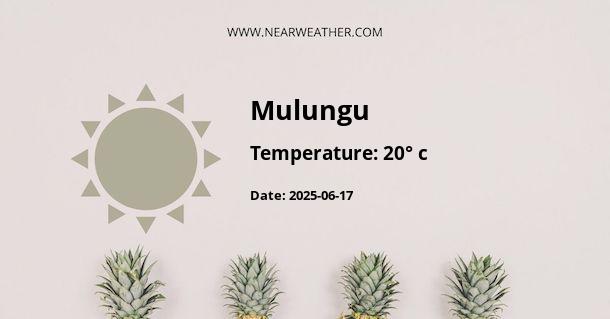Climate and Weather in Mulungu, Brazil
Mulungu is a beautiful municipality located in the state of Ceará, Brazil. It is known for its stunning landscapes, vibrant culture, and unique climate. Understanding the weather patterns and climate of Mulungu is essential for residents, tourists, and businesses operating in the region.
Annual Climate Overview
The climate in Mulungu is classified as tropical savanna, with distinct wet and dry seasons. The region experiences warm temperatures throughout the year, with relatively high humidity levels.
Temperature
The average annual temperature in Mulungu is around 25°C (77°F). The hottest months are typically from September to November, with average high temperatures reaching 32°C (89.6°F). The coolest months are from June to August, with average lows around 20°C (68°F).
Rainfall
Mulungu experiences a pronounced wet season from February to May, with the heaviest rainfall occurring in March. The dry season extends from August to November, with significantly less precipitation during these months. The annual rainfall in Mulungu averages around 900mm (35 inches).
Seasonal Weather Patterns
Understanding the seasonal weather patterns in Mulungu is crucial for planning outdoor activities, agricultural operations, and infrastructure development.
Wet Season
During the wet season, Mulungu experiences frequent and intense rainfall. The lush vegetation and vibrant landscapes are a result of the ample precipitation during this period. It is essential for residents and visitors to be prepared for sudden downpours and occasional thunderstorms.
Dry Season
The dry season in Mulungu brings drier and sunnier weather. While the risk of rainfall decreases during this period, it is important to note that the region's water resources may become more limited. Adequate water management and conservation efforts are critical during the dry season.
Extreme Weather Events
Like many tropical regions, Mulungu is susceptible to extreme weather events such as tropical storms and cyclones. The municipality may experience strong winds and heavy rainfall during these events, which can impact infrastructure and agriculture.
Tropical Storm Preparedness
Residents and authorities in Mulungu must have robust preparedness and response plans in place for tropical storms. These plans should prioritize safety, infrastructure protection, and emergency communication systems to mitigate the impact of extreme weather events.
Impact on Agriculture and Environment
The climate and weather in Mulungu play a significant role in shaping the local agricultural practices and ecosystem sustainability.
Agricultural Calendar
Local farmers and agricultural communities rely on the seasonal rainfall patterns to plan their crop cultivation and harvest schedules. The wet season provides essential moisture for crops, while the dry season necessitates efficient irrigation and water management strategies.
Biodiversity and Conservation
The unique climate of Mulungu contributes to its rich biodiversity, featuring diverse flora and fauna. Conservation efforts in the region are vital to protect the natural habitat and promote sustainable environmental practices.
Conclusion
The climate and weather in Mulungu, Brazil, exhibit characteristic tropical savanna traits, with distinct wet and dry seasons. Understanding the annual climate overview, seasonal weather patterns, extreme weather events, and impact on agriculture and environment is essential for individuals and industries operating in the region.
By embracing sustainable practices and leveraging climate data, Mulungu can thrive while preserving its natural beauty and rich ecological heritage.
A - Mulungu's Latitude is -7.024440 & Longitude is -35.461941.
A - Weather in Mulungu is 27° today.
A - Climate Conditions in Mulungu shows scattered clouds today.
A - Humidity in Mulungu is 65% today.
A - Wind speed in Mulungu is 16.09 km/h, flowing at 94° wind direction. today.
